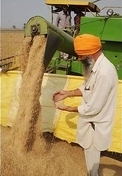
Thailand has lost its crown as the world's top rice exporter for the first time in 30 years. Hampered by an expensive government-run price support scheme, it shipped under seven million tonnes of the grain last year, trailing behind India and Vietnam.
In contrast, India exported 10 million tonnes and Vietnam 7.5 million tonnes, according to figures from the United States Department of Agriculture.
The dethroning is a blow to the country that prides itself as the food basket of Asia, but it is something local exporters had warned of for months as the government-run rice pledging scheme pummelled export figures.
Under the 15-month-old programme, the government guarantees farmers up to 15,000 baht (US$49) per tonne for white rice, more than 50 per cent higher than world prices.
While it has raised the incomes of farmers, it has also turned the government into the main buyer of rice, and resulted in a giant stockpile that cannot find takers on the world market.
According to a World Bank report released last month, the Thai government is sitting on a stock of more than 20 million tonnes of rice, twice the amount the country exported in 2011.
The mountain of rice created storage headaches last year and the government even briefly considered storing it in a cargo building at Don Muang Airport.
The income support programme was a key campaign promise of the ruling Puea Thai party in 2011, and the government has shown no sign of ditching it.
Although government price guarantees for rice are not new, the Puea Thai government differed by not putting a cap on the amount of rice it would buy.
Exporters have been deeply sceptical of claims by the government of deals to sell rice to other governments.
Rice exporter Vichai Sriprasert told The Straits Timesyesterday: "Sooner or later, this plan has got to be scrapped. It's physically impossible to sustain."
The programme benefited just 1.3 million out of 3.6 million of the rice farming households in the harvest year that ended last September.
According to the World Bank report, the scheme cost the government 376 billion baht, or around 3.4 per cent of the country's gross domestic product, in the same period.
In the coming harvest season, assuming none of the rice is sold, the cost of the programme is expected to hit 440 billion baht.
Beyond financial cost, the losses from the programme may be felt in the longer term, noted the World Bank report. The high padi prices have made farmers increase the number of crops each year by producing lower quality rice.
Thailand's rice yield is already one of the lowest among rice growers in the world, and "continued subsidies to rice production may be slowing a needed transformation of Thai agriculture", it said.







